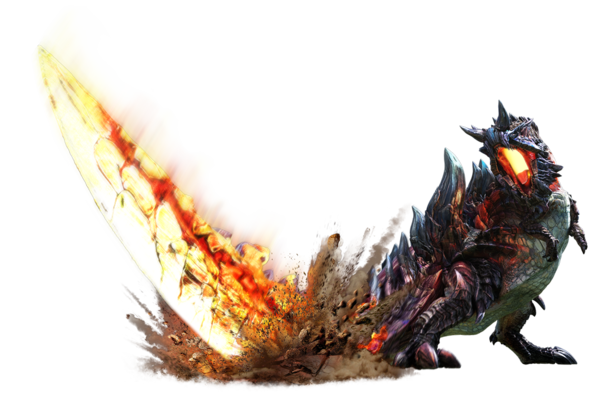
Monster Hunter Generations Localization Notes Part 5 – Glavenus and More Deviant Monsters
Jul 28, 2016 // Marco
Monster Hunter Generations is finally out in the wild! Woo-hoo! To celebrate, I’m back with another look into the localization of the game. We still have six more Deviant Monsters to cover, and we haven’t even talked about the last of the Fated Four yet, so I hope you’re ready for a big dose of Monster Hunter goodness! I also have a little surprise prepared towards the end, so hit the jump to read on.
Glavenus
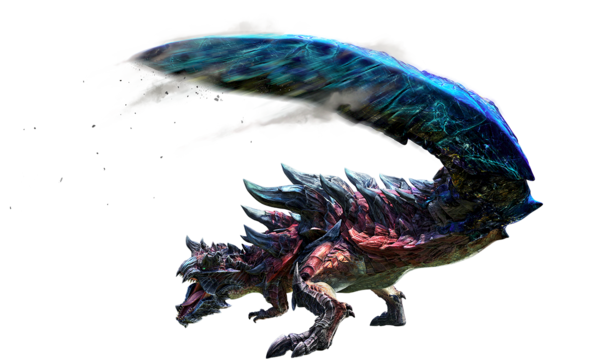
Known as “The Scorching Blade,” the final flagship monster in MH Gen is a fiery Brute Wyvern that reigns as king of the Jurassic Frontier, and will make short work of any monster unfortunate enough to cross its path. You can tell just by the flame-shaped spikes on its back that this is one fearsome monster, but even more so is the fact that it virtually has a sword for a tail! The tail itself is longer than half the total length of its body, and coated in hard minerals, thanks to the repeated scraping of it on the ground and other surfaces during its maturing process. This essentially turns it into a deadly blade that Glavenus uses to make mincemeat out of its prey. If that wasn’t enough, the minerals in its tail contain combustible components, allowing Glavenus to ignite flames by striking it on the ground like a match. After a few strikes, its tail will turn red-hot, increasing its attack power. It eventually cools down and becomes rusty, but don’t let your guard down. Glavenus is able to restore sharpness to its tail by grinding it with its fangs, and can even shoot out a magma-like substance from its mouth at high speed.
 I can only imagine the lower-back pain.
I can only imagine the lower-back pain.
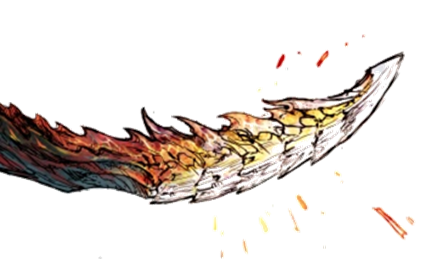
Reference image of the tail’s “heated” state
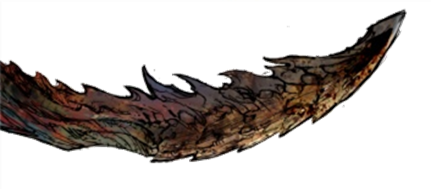
Reference image of the tail’s “rusted” state
Given the information above, the Japanese name, ディノãƒãƒ«ãƒ‰ [ di-no-ba-ru-do ], sums up the monster well, combining words for “dinosaur,” “nova,” and “halberd.” However, after we tried romanizing it, “dino” just felt too on the nose. Also, its tail reminded us more of a sword rather than a halberd. So, we decided to take a different approach and drew from words related to fire, swords, and ferocity in different languages. Here are a few names from the first round of brainstorming:
- Ignagrios: from the Latin word for fire and Greek word for ferocious
- Ardurox: from the Latin words for blaze and fierce
- Kalagrios: from the Greek words for burn and ferocious, and the Latin word for blade
- Dynigrus: from Dyrnwyn, a sword in Welsh lore, and the Latin words for fire and wild
We mulled over our ideas for a while, but we weren’t too crazy about any of them. After some more deliberation, we decided to include something dinosaur-related in the name after all, but only if we could make it more subtle than the original name. We looked to actual names of dinosaurs, such as the Carnotaurus and Tyrannosaurus, and experimented with the –saurus suffix. We shortened it to –us, preceded it with parts of the Latin words for sword and burning, and came up with Glavenus (gladio + fervens + saurus).
Now you know all there is to know about the naming behind the Fated Four! But we’re not done with new monster names just yet. Before we get into the rest of the Deviants, there’s one more monster I’d like to introduce. To best explain the naming behind it, I’ll need to go into a little bit of spoiler territory regarding the nature of the monster, so if you’d rather stay in the dark until you hunt it for yourself, skip ahead to the Dreadking Rathalos and Dreadqueen Rathian below.
[spoiler]
Nakarkos
The newest Elder Dragon in the Monster Hunter series is a real nasty piece of work. A literal monster eater, it will devour any monster, big or small, in attempt to appease its insatiable appetite. Its lair is known as Wyvern’s End, a huge pit littered with the bones of countless monsters, which looks just as horrifying as it sounds:
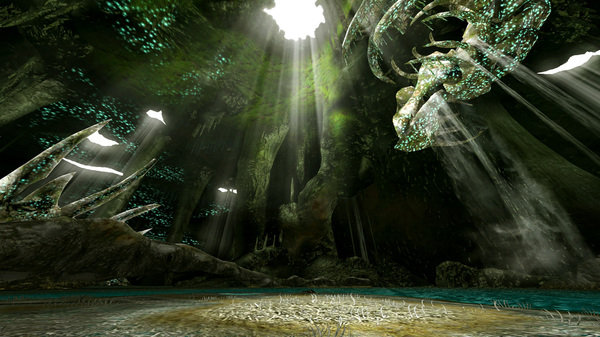 That’s a lot of monster bones.
That’s a lot of monster bones.
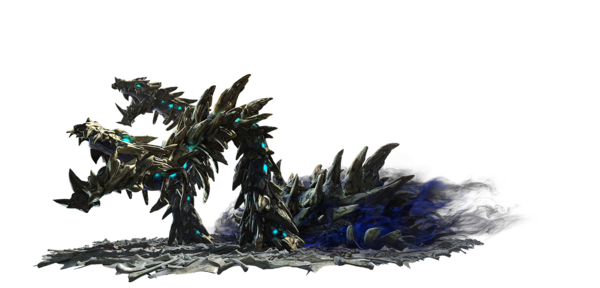
Reference image of Nakarkos during localization
The Japanese name, オストガãƒã‚¢ [ o-su-to-ga-ro-a ], comes from os (Latin for bone), octopus, and Tangaroa, the MÄori god of the sea. But, given the fact this monster is literally surrounded by death, we brought this theme into the mix when brainstorming the international name. Here are a few of our earlier ideas:
- Rakendros: from the words kraken, hydra, and the Latin word for bone
- Sav’gaddha: from the Hindi words for cadaver and pit
- Krakaros: from the words kraken, carcass, and the Greek word for death
It felt like we were on the right track with Krakaros, but the kraken reference was too conspicuous. We switched it out with different cephalopod names, rearranged a few letters, and liked Nakarkos (nautilus + carcass + nekros). It had a dark, macabre sound to it that fit well with the monster’s overall image.
[/spoiler]
Dreadking Rathalos and Dreadqueen Rathian
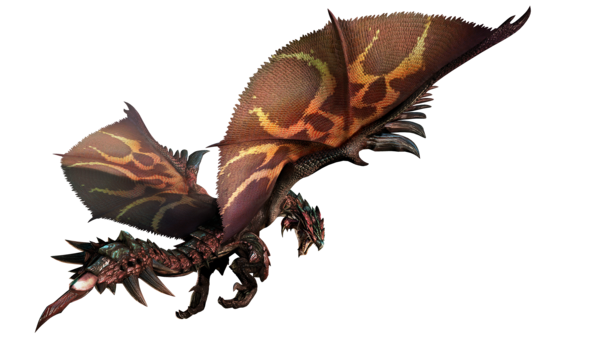
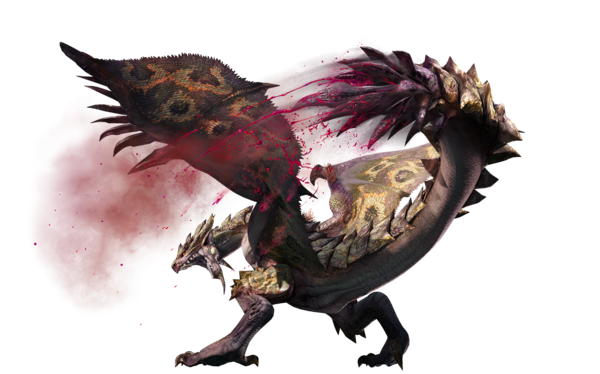
The Japanese names for these Deviants are 黒炎王 [ koku-en-ou ] and 紫毒姫 [ shi-doku-hime ], which literally translate to “black flame king” and “purple poison princess,” respectively. We started out naming these separately, coming up with names like Blackfire, Blackflame, and Flameking for the Rathalos; and Poisonspike, Venomqueen, and Blightqueen for the Rathian. In the end, we decided to give them a pair name based off of their nicknames as the “King of the Skies” and “Queen of the Land.”
Redhelm Arzuros

The Japanese name for this monster, ç´…å…œ [ beni-kabuto ], means “crimson helmet.” We considered using Crimson- for the first part of the name, but went with Red- instead because it gave us more space to brainstorm with for the second half of the name. Some of our other proposals included Redmane and Redcrown, but we stuck with helmet because we liked the imagery. In the end, we still had room in the character limit to use Crimson- , but after brainstorming with Red- , the sound of Redhelm grew on us.
Drilltusk Tetsucabra
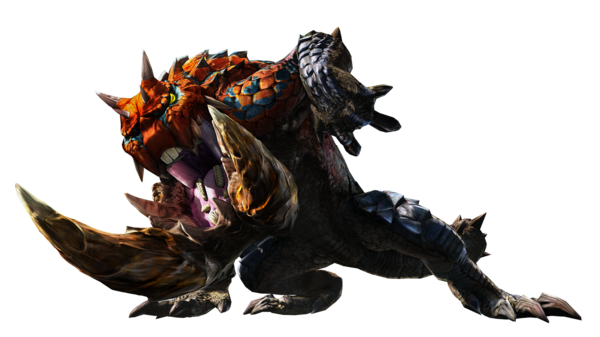
Called 岩穿 [ iwa-ugachi ] in Japanese, which translates to “stone borer.” We initially wanted to use Boretusk or Borefang for this monster, but since we already have a Berserk Tetsucabra, we went with Drill – instead to avoid having two Tetsucabra names that began with a “B.” We thought it would be best that Deviant names didn’t start with the same letter as existing Sub- or Rare species, so we wouldn’t run into any potential issues with associated item names.
Stonefist Hermitaur
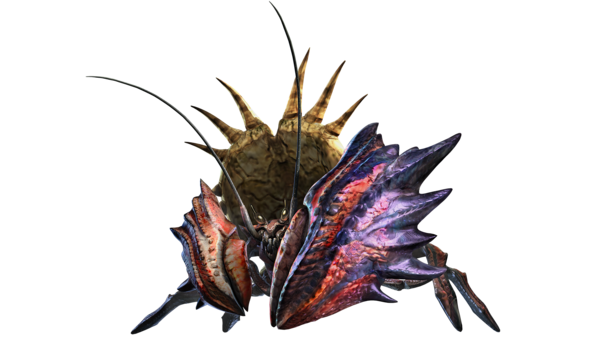
Known as çŸ›ç – [ hoko-kudaki ] or, “spear breaker,” in Japanese. Technically, this monster’s international name should have been Stonefist Daimyo Hermitaur, but since the base name alone was 16 characters, we had to omit Daimyo to allow space for the Deviant convention. Among those in the running for this name were Stonewall and Thickshell, but we decided against them because they only put focus on the monster’s defensive qualities.
Hellblade Glavenus
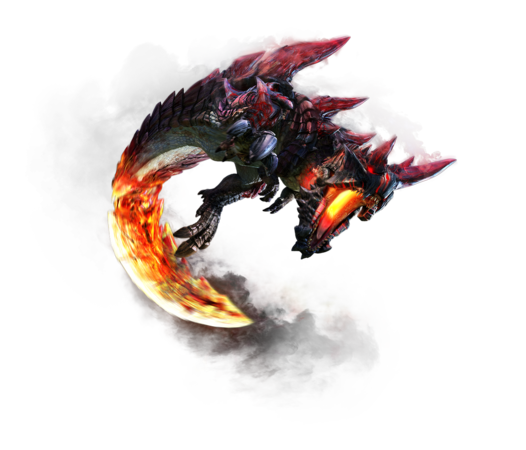
The Japanese name, 燼滅刃 [ jin-metsu-jin ], would roughly translate to something along the lines of “blade that burns all to ash.” A few of our top picks for this Deviant name were Ruinblade and Scorchblade, either of which would have worked well, but Hellblade Glavenus just has such a cool ring to it. Not to mention the fiery red spikes on its head and back make it look very devilish, so Hellblade felt like the perfect fit.
That’s it! Those are all the new monsters you’ll be able to hunt in MH Gen. Which of the new monsters are you looking most forward to hunting? Let us know in the comments below. As for that surprise I mentioned earlier, the Producer and Director of the game themselves asked me to pass on the following messages to all you Monster Hunter fans out there!
Producer Shintaro Kojima
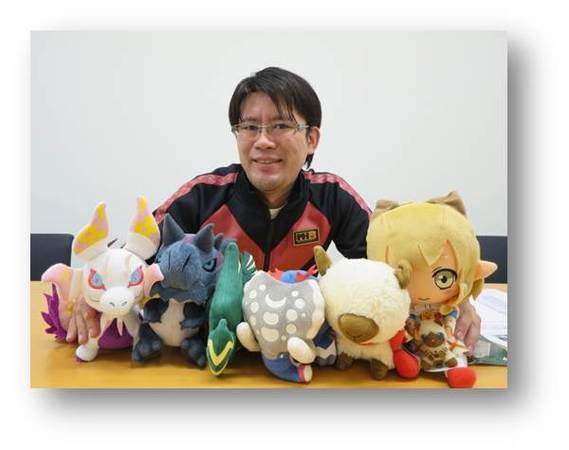 The latest entry in the Monster Hunter series is finally here! I know it’s been a while since the Japanese release of the game, but believe me when I say we worked tirelessly to get the overseas version to you as soon as humanly possible. Thanks so much for being patient with us! Though Monster Hunter Generations is not a numbered entry in the series, you can rest assured that everything you’ve come to know and love about Monster Hunter is still there. But, on top of that, this title has a ton of new features that sets it apart from the rest!
The latest entry in the Monster Hunter series is finally here! I know it’s been a while since the Japanese release of the game, but believe me when I say we worked tirelessly to get the overseas version to you as soon as humanly possible. Thanks so much for being patient with us! Though Monster Hunter Generations is not a numbered entry in the series, you can rest assured that everything you’ve come to know and love about Monster Hunter is still there. But, on top of that, this title has a ton of new features that sets it apart from the rest!
I can’t wait for you to try out all the weapon, Hunting Style, and Hunter Art combinations and find the perfect play style for you. During development, I remember the excitement I had trying out all the features and seeing the new monsters for the first time, so it’s exciting to know that you can now experience that same thrilling feeling I had back then. If you’re a seasoned hunter, you’re going to feel right at home with this title. And if you’re a newcomer, you couldn’t have picked a better time to start hunting! With Monster Hunter Generations, it’s easier than ever to jump into the series.
I really hope you enjoy the game!
Director Yasunori Ichinose
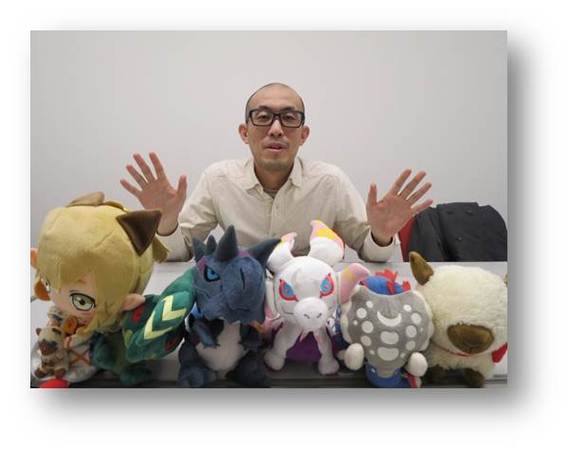 Sorry to keep you waiting so long after the Japanese release, but I think the finished international version of the game came out quite nicely! I hope you agree it was worth the wait. I like to think of Monster Hunter Generations as a celebration of all the Monster Hunter games up until now. We jam-packed this party with tons of content—not only with familiar locations, characters, and monsters from previous games, but lots of new features, too. I’m happy to say that we were even able to include a few collaboration armor sets in this release that we weren’t able to get into the Japanese version. Lucky you!
Sorry to keep you waiting so long after the Japanese release, but I think the finished international version of the game came out quite nicely! I hope you agree it was worth the wait. I like to think of Monster Hunter Generations as a celebration of all the Monster Hunter games up until now. We jam-packed this party with tons of content—not only with familiar locations, characters, and monsters from previous games, but lots of new features, too. I’m happy to say that we were even able to include a few collaboration armor sets in this release that we weren’t able to get into the Japanese version. Lucky you!
We especially put a lot of focus into the new combat mechanics in the game, and now hunting has never been more customizable. With all the new Hunting Styles and Hunter Arts, combat in Monster Hunter is deeper and more versatile than ever before, making it accessible to veteran hunters and new players alike. You can even join the fray as a Felyne. Yes, Prowlers are smaller and furrier than Hunters. But trust me, they’re no less of a threat. Monsters out there better watch out! The Prowlers are coming!
I often hear that Monster Hunter fans overseas are some of the most passionate fans around, so thank you very much for supporting the series throughout the years. I hope the Monster Hunter community grows even bigger with what this title has to offer.
Localization Director Marco Bombasi
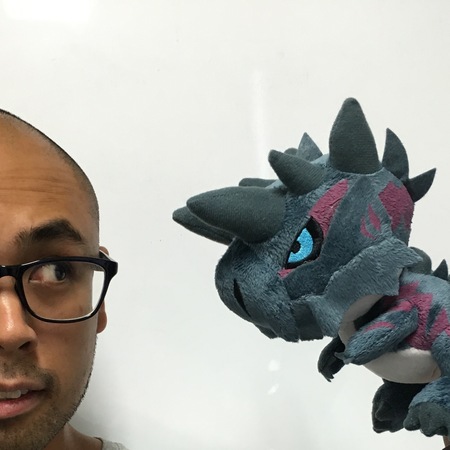
As for me, it just feels great to know that the game’s finally out! It’s been a long year and a half, but the thought of you hunting a Glavenus with your friends makes it all worth it. A special thanks goes out to our friends at Keywords Studios for all their help on the North American and European localization, and everyone at Capcom USA and Capcom Europe for their support throughout the project. The Western release of this title wouldn’t have been possible without their help. Lastly, on behalf of all of us here in the Global R&D department, I’d like to thank you for supporting the series and taking the time to read these blogs. It’s been a pleasure sharing our experiences with you. I hope you’ve enjoyed them!
Now, get out there and show those monsters who’s boss!
-
Brands: Monster HunterTags:
-

Loading...
Platforms:
